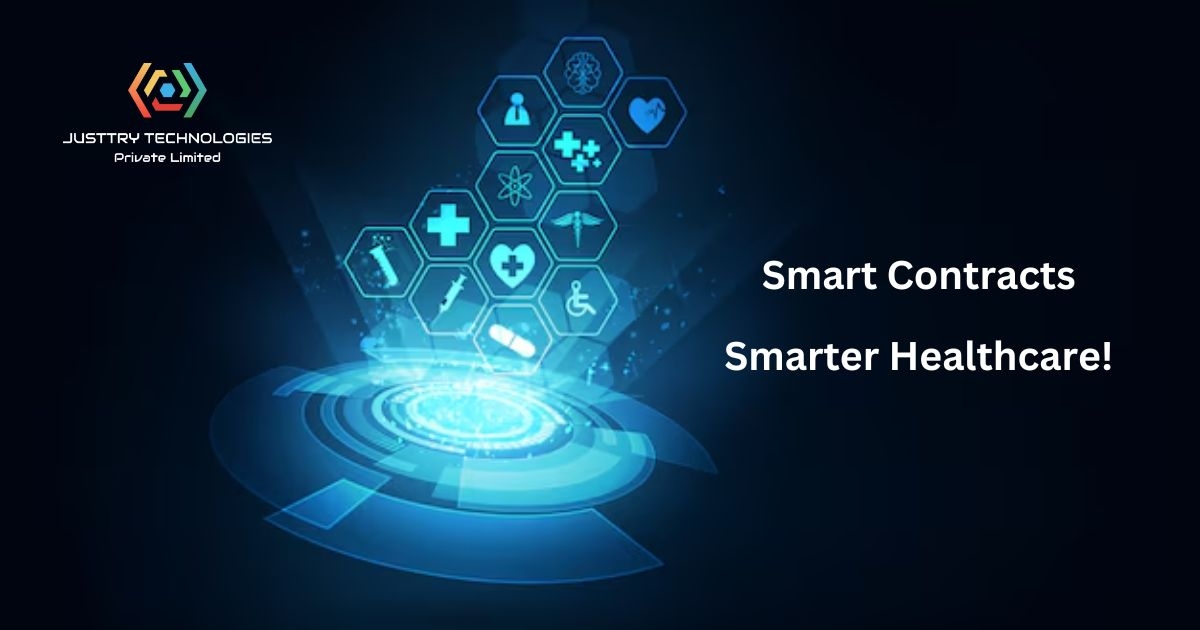The Power of Blockchain in Healthcare Development for Smart Contracts

1. Introduction
Blockchain technology in healthcare is revolutionizing the way medical transactions and patient data are managed. As the industry grapples with inefficiencies, security breaches, and administrative burdens, innovative solutions are in demand. Among these solutions, smart contracts have emerged as a game-changer, automating complex agreements while ensuring transparency and security.
A smart contract is a self-executing digital contract with terms directly written into code. These contracts run on blockchain networks, eliminating intermediaries and minimizing risks. With the rise of blockchain development service providers, healthcare organizations are rapidly adopting smart contracts to enhance efficiency and data security.
2. Understanding Smart Contracts in Healthcare
Smart contracts operate autonomously once predefined conditions are met, reducing the need for manual oversight. In healthcare, they facilitate seamless transactions, from patient record management to insurance claims processing.
Blockchain development company solutions enable the deployment of these contracts, ensuring accuracy and compliance. The key characteristics of smart contracts include:
-
Automation – Eliminates paperwork and manual processing.
-
Immutability – Prevents unauthorized alterations, ensuring data integrity.
-
Decentralization – Reduces reliance on intermediaries, fostering trust.
By leveraging smart contracts, healthcare institutions can streamline processes, mitigate fraud, and enhance patient care.
3. Benefits of Blockchain-Powered Smart Contracts in Healthcare
Enhanced Security and Data Integrity
Data security remains a major concern in healthcare. Traditional systems are vulnerable to cyber threats, leading to breaches of sensitive medical records. Blockchain technology ensures:
-
Immutable record-keeping – Data stored on a blockchain cannot be altered or tampered with.
-
Advanced encryption techniques – Protects patient data from unauthorized access.
Automation and Efficiency
Healthcare is riddled with administrative inefficiencies, from claims processing to patient onboarding. Smart contracts eliminate manual interventions by:
-
Automating claims verification – Reducing processing times for insurance payouts.
-
Ensuring accurate billing – Preventing overcharges and fraud.
Transparency and Trust
The decentralized nature of blockchain fosters trust between stakeholders. In healthcare, this translates to:
-
Real-time access to patient data – Physicians, insurers, and patients can view updated records instantly.
-
Elimination of third-party intermediaries – Reducing costs associated with claim disputes.
4. Real-World Applications of Smart Contracts in Healthcare
Patient Consent Management
Managing patient consent is a critical aspect of healthcare. Traditional methods involve paperwork, which can be lost or manipulated. Smart contracts:
-
Record patient approvals on a tamper-proof ledger – Ensuring compliance with consent policies.
-
Enable real-time verification – Healthcare providers can instantly access consent status.
Medical Billing and Insurance Claims
Insurance fraud and delayed reimbursements are major challenges in the industry. Smart contracts streamline these processes by:
-
Automating insurance claim approvals – Eliminating the need for lengthy verification procedures.
-
Ensuring fraud detection – By verifying patient eligibility and treatment details.
Drug Supply Chain Management
Counterfeit medications pose a severe threat to patient safety. Blockchain development company solutions:
-
Ensure end-to-end traceability of pharmaceuticals – Reducing counterfeit drugs in circulation.
-
Enhance compliance with regulatory standards – Through real-time verification of manufacturing and distribution data.
5. Challenges and Considerations in Implementing Blockchain Smart Contracts
Regulatory and Compliance Hurdles
Healthcare is a highly regulated industry, with stringent laws like HIPAA and GDPR. Organizations must:
-
Ensure data privacy compliance – By designing blockchain solutions that align with regulatory requirements.
-
Engage policymakers – To drive legislative support for blockchain adoption.
Interoperability Issues
Blockchain solutions must integrate seamlessly with existing healthcare systems. Challenges include:
-
Legacy system compatibility – Many healthcare databases are outdated and may not support blockchain-based upgrades.
-
Standardization concerns – Different institutions may use varied blockchain protocols, leading to fragmentation.
Scalability Concerns
With increasing adoption, blockchain networks must support higher transaction volumes. Solutions include:
-
Layer 2 scaling solutions – Enhancing processing speeds without compromising security.
-
Hybrid blockchain models – Combining public and private blockchains for efficiency.
6. The Future of Smart Contracts in Healthcare Development
As blockchain technology in healthcare continues to evolve, emerging technologies like AI and IoT will further enhance its capabilities. In the near future, we can expect:
-
AI-driven smart contracts – Automating complex medical processes with machine learning integration.
-
Global adoption and standardization – Governments and healthcare regulators implementing universal blockchain standards.
-
Improved patient-centric care – With blockchain enabling secure, personalized medical services.
The adoption of smart contracts through blockchain development service providers is reshaping healthcare. With enhanced security, efficiency, and transparency, this technology is set to redefine the future of medical operations. Institutions embracing blockchain development company solutions will lead the charge in transforming global healthcare systems.
Conclusion
Blockchain-powered smart contracts are revolutionizing healthcare by enhancing security, efficiency, and transparency. From automating insurance claims to securing patient data and streamlining supply chains, blockchain technology in healthcare is eliminating inefficiencies and reducing fraud. By leveraging decentralized, tamper-proof systems, healthcare providers can ensure accurate records, faster transactions, and improved patient outcomes.
Despite challenges like regulatory compliance and interoperability, the potential for smart contracts remains immense. With the support of blockchain development service providers and continuous innovation, the healthcare industry is on the path to a more automated, trustworthy, and cost-effective future. As blockchain development company solutions evolve, the widespread adoption of smart contracts will redefine the way healthcare operates, benefiting providers, insurers, and patients alike.
- Questions and Answers
- Opinion
- Story/Motivational/Inspiring
- Technology
- Art
- Causes
- Crafts
- Dance
- Drinks
- Film/Movie
- Fitness
- Food
- Giochi
- Gardening
- Health
- Home
- Literature
- Music
- Networking
- Altre informazioni
- Party
- Religion
- Shopping
- Sports
- Theater
- Wellness
- News
- Culture
- War machines and policy

